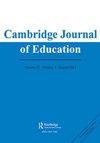“我们是人,你知道的”:孩子们对在英语课堂上使用录像的看法
IF 1.5
3区 教育学
Q2 EDUCATION & EDUCATIONAL RESEARCH
引用次数: 0
摘要
本研究旨在探讨儿童对在英语作为外语课堂中使用录像的看法,并促进儿童声音在外语课堂决策过程中的纳入。这项研究是在加泰罗尼亚的一所小学进行的,为期三年。数据收集和分析解释现象学的方法,采用道德对称的方法,儿童作为研究参与者。研究结果表明,视频记录可以成为鼓励自我反思的有用课堂资源,但摄像机的出现和随后的自我观察可能会引发强烈的情绪反应,并产生过度批评和潜在的削弱语言学习的态度。孩子们的声音贡献为策略性地和合乎道德地使用视频记录提供了深刻的见解,同时也提出了关于儿童隐私权和数据保护的重要问题,并在英语课堂上使用他们的母语表达他们的观点。本文章由计算机程序翻译,如有差异,请以英文原文为准。
‘We are people, you know’: children’s views on the use of video recordings in the EFL class
ABSTRACT A study is presented with a twofold objective related to child voice: to explore children’s views on the use of video recordings in an EFL (English as a Foreign Language) class, and to promote the inclusion of child voice in decision-making processes in the foreign language classroom. The study was carried out in a primary school setting in Catalonia over a three-year period. Data was collected and analysed within an interpretative phenomenological approach, adopting an ethically symmetrical approach to children as research participants. Findings suggest that video recordings can be a useful classroom resource to encourage self-reflection, but that camera presence and subsequent self-viewing can provoke strong emotional reactions and generate overly critical and potentially debilitating attitudes to language learning. Child voice contributions provide insightful ideas to use video recordings strategically and ethically, while also raising important questions about children’s rights to privacy and data protection, and to express their views using their L1 in the EFL class.
求助全文
通过发布文献求助,成功后即可免费获取论文全文。
去求助
来源期刊

Cambridge Journal of Education
EDUCATION & EDUCATIONAL RESEARCH-
CiteScore
5.30
自引率
4.30%
发文量
35
期刊介绍:
Cambridge Journal of Education publishes original refereed articles on all aspects of education, with a particular emphasis on work that contributes to a shared understanding amongst academic researchers, theorists, practising teachers, policy-makers and educational administrators. The journal also welcomes the submission of systematic review articles that summarise and offer new insights into specific areas of educational concern. With a wide international readership, Cambridge Journal of Education publishes contributions drawn from different educational systems and cultures enabling continued in-depth discussion of global educational theory, policy and practice. The journal’s Special Issue programme encourages and stimulates focused discussion and engagement with significant themes and responses to topics raised by readers and contributors. Cambridge Journal of Education welcomes proposals for future editions.
 求助内容:
求助内容: 应助结果提醒方式:
应助结果提醒方式:


